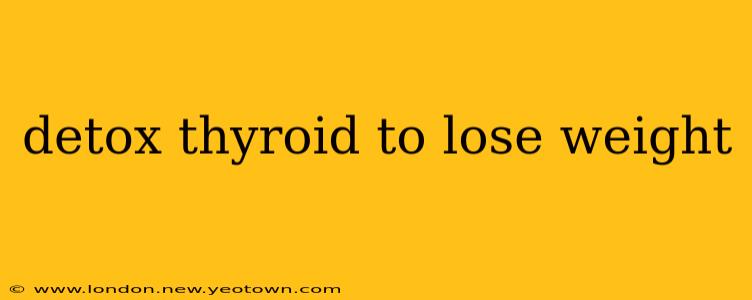Detoxing Your Thyroid for Weight Loss: A Holistic Approach
The idea of "detoxing your thyroid" to lose weight is a popular one, often circulating in online health communities. However, it's crucial to understand that the thyroid gland doesn't actually need a detox in the traditional sense. The thyroid is a vital organ responsible for regulating metabolism, and problems with its function can significantly impact weight. Instead of a detox, focusing on supporting healthy thyroid function is key to achieving weight loss goals. This holistic approach involves several interconnected strategies that work together to optimize your body's natural processes.
Let's explore this in detail. This isn't about quick fixes or miracle cures, but rather a sustainable, evidence-based approach to improving your health and potentially aiding weight loss.
What is the thyroid and how does it affect weight?
Your thyroid gland, located in your neck, produces hormones that regulate your metabolism – the rate at which your body burns calories. When your thyroid isn't functioning optimally (hypothyroidism – underactive or hyperthyroidism – overactive), your metabolism can slow down or speed up, directly impacting your weight. Hypothyroidism often leads to weight gain, while hyperthyroidism can cause unintended weight loss. Understanding your thyroid health is the first step. If you suspect a thyroid issue, consult a doctor for proper diagnosis and treatment. They can run blood tests to measure your thyroid hormone levels (TSH, T3, T4).
Can certain foods or diets help support thyroid health?
Absolutely! A balanced diet rich in specific nutrients plays a crucial role in supporting thyroid function. Many people believe certain foods can help “detox” the thyroid; while not a detox in the literal sense, these nutrients are essential for optimal thyroid health.
- Iodine: This is a crucial element for thyroid hormone production. Good sources include iodized salt, seafood (like cod and tuna), and seaweed.
- Selenium: This mineral is also essential for thyroid hormone production and helps protect the thyroid from damage. Brazil nuts are a fantastic source, along with other nuts, seeds, and whole grains.
- Zinc: Zinc supports thyroid hormone production and metabolism. Find it in oysters, red meat, poultry, beans, and nuts.
- Iron: Iron deficiency can affect thyroid hormone production. Lean red meat, spinach, lentils, and beans are excellent sources.
What are the common symptoms of an underactive thyroid (hypothyroidism)?
Recognizing the signs of hypothyroidism is essential for seeking timely medical help. Common symptoms include:
- Unexplained weight gain: This is often a primary symptom, accompanied by difficulty losing weight despite dietary efforts.
- Fatigue and lethargy: Feeling constantly tired and lacking energy is a hallmark of hypothyroidism.
- Constipation: Slowed metabolism can also affect bowel movements.
- Dry skin and hair: Hypothyroidism can lead to dry, brittle hair and skin.
- Muscle weakness and aches: Reduced energy levels contribute to muscle weakness and aches.
- Intolerance to cold: You may feel unusually cold even in moderate temperatures.
- Depression and anxiety: Hypothyroidism can impact mental health.
If you're experiencing several of these symptoms, it's vital to consult a doctor for a proper diagnosis.
How can stress affect thyroid function and weight?
Chronic stress significantly impacts thyroid function. Stress hormones can interfere with thyroid hormone production and metabolism, leading to weight gain and other health problems. Managing stress through techniques like yoga, meditation, or spending time in nature can be beneficial.
Are there supplements that support thyroid health?
While a balanced diet provides most necessary nutrients, some individuals may benefit from specific supplements after consulting their doctor. These should always be used under medical supervision. Supplements are not a replacement for medical treatment if a thyroid condition is diagnosed.
What is the role of exercise in managing thyroid health and weight?
Regular exercise is crucial for overall health, including managing thyroid function and weight. It helps boost metabolism, burn calories, and reduce stress—all contributing factors to weight management when dealing with thyroid issues. Choose activities you enjoy and aim for at least 30 minutes of moderate-intensity exercise most days of the week.
Disclaimer: This information is for educational purposes only and should not be considered medical advice. Always consult with a healthcare professional before making any changes to your diet or treatment plan, especially if you have a thyroid condition or are considering taking supplements. They can accurately diagnose any thyroid issues and recommend appropriate treatment.

